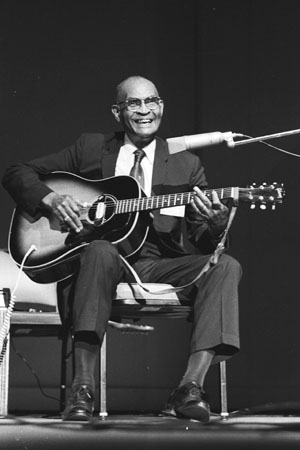Robert Wilkins (January 16, 1896 – May 26, 1987) was an American blues guitarist and vocalist, of African American and Cherokee descent.Robert Timothy Wilkins was born in Hernando, Mississippi, 21 miles from Memphis.He served in the Army during World War I but returned to Memphis in 1919 to become a professional musician.
Wilkins worked in Memphis during the Roaring Twenties, sharing billing with Furry Lewis, Memphis Minnie (whom he claimed to have tutored), Son House, and other musicians for local shows.
He also organized a jug band to capitalize on the "jug band craze" then in vogue. Though never attaining success comparable to the Memphis Jug Band, Wilkins reinforced his local popularity with a 1927 appearance on a Memphis radio station. Like Sleepy John Estes (and unlike Gus Cannon of Cannon's Jug Stompers) he recorded alone or with a single accompanist. He sometimes performed as Tim Wilkins or as Tim Oliver (his stepfather's name).
His best known songs are "That's No Way To Get Along" (to which he – an ordained minister since the 1930s – had changed the 'unholy' words to a biblical theme and since titled it "The Prodigal Son", covered under that title by The Rolling Stones), "Rolling Stone", and "Old Jim Canan's". His first sessions for the Victor label in 1928 yielded the droning, one-chord "Rolling Stone," whose title, if not structure, later inspired Muddy Waters.Led Zeppelin also wrote "Poor Tom", which was believed to have been influenced by "That's No Way To Get Along".
During the 1920s and 1930s, Robert Wilkins was one of the most popular blues artists associated with Beale Street. In a personal crisis, he turned to the Lord, offering his life in exchange for that of his beloved wife, and never looked back.Alarmed by fighting at a party where he was playing, he deserted secular music and he took up the twin careers of herbalist and minister in the Church of God in Christ in the 1930s, and began playing gospel music with a blues feel.
When the Rolling Stones recorded Wilkins' "Prodigal Son" in the early '60s, blues researchers found Wilkins at home in Memphis, ministering to the congregation at the Lane Avenue Church of God in Christ and performing gospel songs (which bore a striking melodic similarity to Tim Wilkins' blues) at street corner revivals.Made appearances at folk festivals and recording his gospel blues for a new audience. These include the 1964 Newport Folk Festival; his performance of "Prodigal Son" there was included on the Vanguard album Blues at Newport.His distinction was his versatility; he could play ragtime, blues, minstrel songs, and gospel with equal facility.
Wikins died in May 1987 in Memphis, Tennessee, at the age of 91.

No comments:
Post a Comment